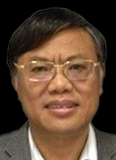
Prof. De-Shuang Huang IEEE Fellow, IAPR Fellow, AAIA Fellow Eastern Institute of Technology, China / Tongji University, China | Biography: De-Shuang Huang is a Professor, Director of Biomedical Data Mining and Computing ab, Eastern Institute of Technology, Ningbo, China. He is currently the Fellow of the IEEE (IEEE Fellow), the Fellow of the International Association of Pattern Recognition (IAPR Fellow), the Fellow of the Asia-Pacific Artificial Intelligence Association (AAIA), and associated editors of IEEE/ACM Transactions on Computational Biology & Bioinformatics and IEEE Transactions on Cognitive and Developmental Systems, etc. He founded the International Conference on Intelligent Computing (ICIC) in 2005. ICIC has since been successfully held annually with him serving as General or Steering Committee Chair. He also served as the 2015 International Joint Conference on Neural Networks (IJCNN2015) General Chair, July12-17, 2015, Killarney, Ireland, the 2014 11th IEEE Computational Intelligence in Bioinformatics and Computational Biology Conference (IEEE-CIBCBC) Program Committee Chair, May 21-24, 2014, Honolulu, USA. He has published over 480 papers in international journals, international conferences proceedings, and book chapters. Particularly, he has published over 260 SCI indexed papers. His Google Scholar citation number is 23867 times and H index 80. His main research interest includes neural networks, pattern recognition and bioinformatics. His main research interest includes neural networks, pattern recognition and bioinformatics. Speech Title: Big Data Graph Learning and Prediction in Healthy Age Abstract: Graph Neural Networks (GNNs) have achieved advanced performance in many fields such as traffic prediction, recommendation systems, and computer vision. Recently there are majorities of methods on GNN focusing on graph convolution, and less work about pooling. To address the problems of information loss and low feature representation capability during graph pooling operations. In this report, we explore higher efficient graph-level representation learning methods and their application to bioinformatics. Firstly, to address the problem of information loss in the pooling operation, we propose a hierarchical graph-level representation learning method with self-adaptive cluster aggregation. Secondly, to address the fact that all existing graph pooling models based on mutual information maximization need to construct negative samples and usually only consider local neighborhood information, we propose a mutual information graph pooling method based on simple Siamese network. Finally, we present an application of our proposed graph-level representation learning method to healthy aging prediction by using scRNA-seq data. |
Prof. Yulin Wang IEEE Senior Member Wuhan University, China | Biography: Yulin Wang is a full professor in the School of Computer Science at Wuhan University in China. His research interests span a range of areas including image and video processing, digital rights management, information security, intelligent systems, e-commerce, the Internet of Things (IoT), and code clone analysis. He obtained his PhD degree from the University of London in the UK. Prior to that, he received his master's and bachelor's degrees from Huazhong University of Science and Technology (HUST) and Xi-Dian University, respectively, both located in China. Before joining Wuhan University, Professor Wang had a successful career in the high-tech IT industry, including working at HUAWEI© and a national research institute, for over ten years. He has been involved in numerous national and international research projects, totaling more than 15. In the past 10 years, Professor Wang has authored one book and published over 50 journal and conference papers, several of which have appeared in IEEE TIP. He holds 10 authorized patents. He has served as the Editor-in-Chief of two international journals and as a reviewer for top-tier IEEE and ACM journals. Additionally, he has served as a reviewer for innovative talent projects and national research funds, including the National High Technology Research and Development Program of China. During 2008-2010, Professor Wang served as an external PhD advisor at Dublin City University in Ireland. In the past 10 years, he has chaired over 10 international conferences and delivered keynote speeches at more than 20 international conferences. He has also visited numerous countries, including the US, France, Italy, Portugal, Croatia, Australia, Germany, Korea, Ireland, Singapore, Malaysia, Japan, and Hong Kong. Furthermore, since 2014, Professor Wang has been appointed as the deputy director of the Hubei Provincial Science and Technology Commission (CAPD). Speech Title: Intelligent Multimedia Data Hiding: Techniques and Applications Abstract: Digital music, podcasts, live and recorded webinars, video calls, and streaming video have changed the way in which we communicate, and have become ubiquitous in virtually every organization. We employ these methods to convey ideas, train our employees, engage our customers, and of course entertain. The question is, does digital multimedia pose a threat? Could these channels be used to communicate information covertly, ex-filtrate intellectual property, share insider information, be used to convey command and control information, or provide the needed enabling technology for advanced persistent threats? Additionally, since the size of multimedia files are typically much larger than a single digital photo, does this mean that larger payloads of hidden information could be exchanged or leaked by exploiting weaknesses inherent in multimedia carriers? Or, on the contrary, is the human auditory system sensitive to even small changes in multimedia information such that we could detect anomalies caused by embedding hidden information in such streams? In this talk, we present the intelligent multimedia data hiding techniques and their possible application. We will cover some of the earliest and simplest forms of data hiding in digital multimedia and then move to some of the lasted innovations in order to provide insight into these questions. Some of the research branches, called reversible data hiding, is also depicted. |
Prof. Wenhua Qian Yunnan University, China | Biography: Wenhua Qian was born in 1980/01/20, received his M.Sc. (2005) and PhD in Computer Sciences (2010) from Yunnan University. Now he is currently a professor and doctoral supervisor at Computer Science and Engineering Department of Yunnan University, Kunming China. He is also a Postdoctoral Research Fellow with the Department of Automation, Southeast University, Nanjing, China.
Speech Title: Cultural Computing and Cultural Digital Media Research Abstract: The report is about the research work of our virtual media computing and cognition lab. There so many special art works in China, such as Chinese ink painting, Chinese paper cutting, Chinese calligraphy, etc. In addition, there are also exist Heavy colored painting,Batik painting, Dongba writing, woodcut special works in the Yunnan province. The multi-ethnic cultural heritage of Yunnan province is an important part of the cultural heritage of the Chinese nation. The number of material and cultural heritage and intangible cultural heritage is in the forefront of the country. Based on the theory and methods of the computer graphics and image processing, the team members in our lab choose some unique artistic styles and ethnic culture as the research object, and carry out the research on virtual media of national culture. So, the report mainly includes three research work: (1) visual media computing; (2) digital simulation of ethnic minority culture in Yunnan; (3) visual connotation extraction and scientific understanding of ethnic culture. It will display some special art styles which are simulated through digital techniques, and how to inhert and protect our culture by the extraction and understanding of the cultural heritage. |
Prof. Zhenghao Shi Xi'an University of Technology, China | Biography: Zhenghao Shi obtained his Ph.D. degree in computer architecture from Xi’an Institute of Microelectronics, Xi’an, China, in 2005. In 2000, he joined Xi’an University of Technology, Xi’an, China, where he currently holds the position of a full professor in the Department of Computer Science and Engineering. Additionally, he serves as a member of the Academic Committee of Xi'an University of Technology, Chairman of the Computer Vision Technology Professional Committee of Shaanxi Computer Society, Vice Chairman of the Biomedical Intelligent Computing Professional Committee of Shaanxi Computer Society, director of the research team for "Intelligent Image Processing and Applications" at Xi'an University of Technology, and an editorial board member of the Chinese Journal of Graphics and Images. Between 2006 and 2007, and again from 2008 to 2009, he was on leave from Xi'an University of Technology to serve as a postdoctoral researcher at the Department of Computer Science and Engineering at Nagoya Institute of Technology in Nagoya, Japan, specializing in image research. From 2007 to 2008, he worked as a research associate at the Kurt Rossmann Laboratories for Radiologic Image Research, Department of Radiology, Division of Biological Sciences, at the University of Chicago. From December 2016 to December 2017, he served as a visiting associate professor in the Image Display, Enhancement, and Analysis (IDEA) Lab, Department of Radiology, Division of Biological Sciences, at the University of North Carolina at Chapel Hill (UNC). His research interests encompass neural networks for image processing and pattern recognition, computer-aided diagnosis, as well as image processing techniques inspired by the human visual systems. To date, he has authored or co-authored over 60 academic papers, and several of these have been published as first author or corresponding author. He has been awarded 2 second prizes of Shaanxi Province Science and Technology Progress Award (ranked first), 1 second prize of Xi'an Science and Technology Progress Award (ranked first), 2 second prizes of Shaanxi Higher Education Science and Technology Award (ranked first), and 1 second prize of Shaanxi Computer Society Science and Technology Progress Award (ranked first). Additionally, he was recognized with the 2022 Wiley Weili China Open Science High Contribution Author Award for his significant contributions to the field. Professor Shi is a Distinguished Member of the China Computer Federation (CCF), a member of the Institute of Electrical and Electronics Engineers (IEEE), and also a member of the Association for Computing Machinery (ACM). Speech Title: Low light image processing based on deep learning Abstract: In practical applications, the enhancement processing of low light and low illumination images has always faced the problem of low efficiency and low quality. This report will introduce the research progress of this issue based on our practical experience in this field in the past two years, with a focus on reporting our work and achievements in using deep learning methods for low light image enhancement. |



